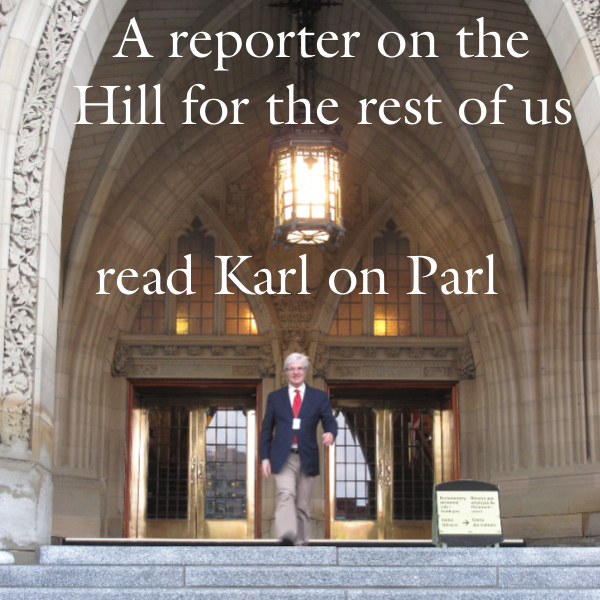It is time for Democratic Reform Minister Pierre Poilievre and his Harper government colleagues to put up or shut up.
They say the “ordinary Canadians” they meet support the Fair Elections Act.
So where are those folks?
Why haven’t the Conservatives invited any of those “ordinary Canadians” to the House Committee that is now considering the Act to speak in its support?
So far, every single witness at Committee, save one, has been highly critical of the Act.
Treasury Board President Tony Clement dismisses all of those critical witnesses — from Jean-Pierre Kingsley, who was Chief Electoral Officer for 17 years; to highly respected Manitoba political scientist, Paul Thomas; to the chief electoral officers of a number of provinces; to former Auditor General, Sheila Fraser — as “self-styled” experts.
“Ordinary Canadians,” Clement and Poilievre say, agree that Canadian citizens should have to show ID in order to vote.
The Conservatives do not say whether those “ordinary Canadians” realize that for millions of Canadian citizens the proposed law will, in fact, require not one but two pieces of ID, and that one of those pieces of ID will have to include current street address.
Details, facts, evidence: none of them are Harper government strong suits.
So here’s a challenge to Poilievre, and to Saskatchewan Conservative MP Tom Lukiwski and the other Conservatives on the Procedure and House Affairs Committee: invite five or ten of those supportive “ordinary Canadians” to share their views on the Fair Elections Act with the Committee.
The Committee has the right to invite anyone it deems fit to testify. One does not have to be an expert — self-proclaimed or otherwise — to testify before a House of Commons Committee.
Indeed, it is unprecedented for a government to propose legislation and then get virtually nobody to step up and speak publicly at Committee in its support.
Normally, at Parliamentary committees considering new laws, the split among witnesses is close to 50-50 — half in favour and half opposed.
In this case, it boggles the mind, but the Conservatives don’t seem to care that they can’t find anyone other than Carleton Management Professor Ian Lee (another of those “self-styled experts”) to say a good word about their Bill.
As politicians, Poilievre says, he and his colleagues talk to hundreds of people, and those folks are onside with his Act. Well, who are those people — and why haven’t any spoken up publicly?
What do ‘ordinary Canadians’ actually agree with?
One gets the impression that Harper’s minions have done some polling on the narrow question of “should voters provide ID” and have received a measure of reassuring response.
Of course, putting the question that way does not reflect what the Bill actually says and what it would do.
That question does not ask respondents if they agree that millions of Canadians should be obliged to provide two pieces of ID, one of which must have their current address.
Nor does it ask if respondents agree with the government doing away with the one piece of federal government issued ID, with address, which all voters receive: Elections Canada’s Voter Information Card. People this writer has spoken to were unaware that this particular outrage is part of the Fair Elections Act. There so many outrages it is hard to keep track.
Further, such a poll-question does not seek to find out if respondents share Poilievre’s visceral, vicious and hateful contempt for Elections Canada and, in particular, its head, the Chief Electoral Officer.
This Government’s entirely unfounded, mean and nasty attacks on the integrity of Canada’s internationally respected, non-partisan election agency are completely without precedent in this country.
Never in Canadian history has an officer of Parliament been so unjustly bullied and vilified by the government that appointed him.
Poilievre’s contempt part of a Conservative tendency toward one-party rule
When asked to explain this heavy-handed campaign of hate, Poilievre has the enormous chutzpah to say: “The Chief Electoral Officer reports to Parliament, not the other way around.”
Hold on a minute — what does that mean, anyway?
In the first place, Poilievre conflates Parliament with the government.
They are not one and the same.
The Conservatives have the majority of seats in the elected House, but they only won 39 per cent of the votes last time. The other 61 per cent of voters are represented in the House by the opposition members, who are as much part of Parliament as the government members.
Poilievre conveniently forgets this.
He also forgets that officers of Parliament do indeed “report” to Parliament. They report on their findings, rulings, and activities. What they do not do — and must not do — is take orders from the government in power. If such officers did take orders from the Parliamentary majority that would totally undermine their legally-guaranteed, and essential independence.
These Conservatives seem to think that getting a majority in an election is a license to practice one-party rule. And they appear to believe that there should be complete identification of the governing party and the State, with no daylight between them.
Poilievre’s utter contempt for officers of Parliament — which is what most worries former Auditor General Sheila Fraser — is only one example of this one-party-rule mentality. (For other examples, see under: “use of time allocation” and “omnibus budget implementation bills”).
What’s next?
Will the Harper government tell the current Auditor General (AG) to buzz off when he reports to Parliament on government mismanagement and waste? Will it tell AG Michael Ferguson: “you’re accountable to us; we’re not accountable to you”?
What about the Official Languages Commissioner, or the Environment Commissioner, or, for that matter, the Governor of the Bank of Canada or the Chief Justice of the Supreme Court?
Will the Harper government tell them all: “we’re elected politicians and we don’t have to pay heed to a word any of you ever says”?
Is this is where we are heading with Harper’s increasingly frightening Fair Elections Act and everything it represents?




